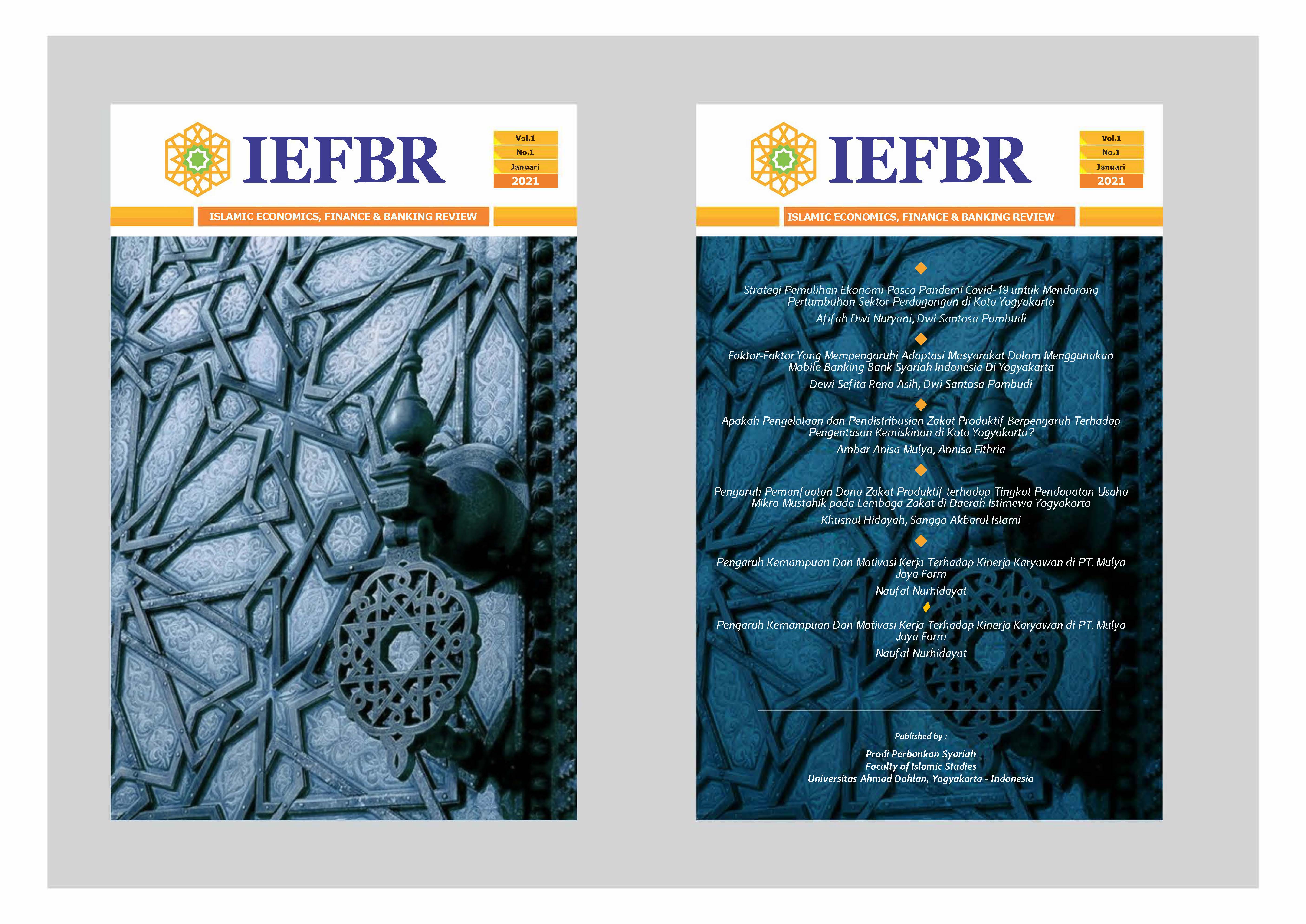Pengaruh Bulan Ramadhan Terhadap Return Saham Perusahaan Di Sektor Makanan Dan Minuman Yang Tergabung Dalam Indeks Harga Saham Gabungan (IHSG) Periode 2012-2022
DOI:
https://doi.org/10.12928/iefbr.v3i1.10951Keywords:
Ramadhan Effect, Return, Saham, AnomaliAbstract
Ramadhan Effect adalah salah satu anomali pasar yang terjadi pada Bulan Ramadhan dimana peristiwa ini dapat mempengaruhi keadaan suatu pasar modal. Penelitian ini menelisik lebih dalam tentang bagaimana return saham dalam sektor makanan dan minuman memberikan reaksi terhadap Bulan Ramadhan serta memberikan gambaran terkait kondisi pasar modal dalam sektor tersebut selama Bulan Ramadhan. Emiten yang menjadi objek penelitian ini adalah perusahaan yang tergabung dalam Indeks Harga Saham Gabungan (IHSG) sejumlah 62 emiten dengan teknik pengambilan sampel menggunakan purposive sampling sejumlah 59 emiten. Metode yang digunakan untuk menganalisis adanya Ramadhan Effect yaitu menggunakan analisis Deskriptif. Hasil dari analisis tersebut menunjukkan Bahwa nilai return pada Bulan Ramadhan cenderung lebih tinggi dibandingkan dengan niali return pada saat selain Bulan Ramadhan dan dapat dikatakan bahwa Bulan Ramadhan berpengaruh terhadap return saham perusahaan makanan dan minuman di Indonesia.
References
Al-Hajieh, H., Redhead, K. Dan Rodgers, T. (2011), “Sentimen Investor Dan Efek Anomali Kalender: A Studi Kasus Dampak Ramadhan Pada Pasar Islam Timur Tengah”,Penelitian Dalam Bisnis Internasional Dan Keuangan,Jil. 25 No.3, Hal.345-356.
Amyulianthy, R. (N.D.). Pengujian Empiris Efficient Market Hypothesis (Emh) Dan Capital Asset Pricing Model (Capm). 2(1).
Hartini, T., Amir, A., Junaidi, J., & Lubis, T. A. (2019). The Difference Analysis Of Abnormal Return And Trade Volume Activity Before And After Ramadhan Effects On Food And Beverages Companies Listed In Indonesian Sharia Stock Index (Issi). Journal Of Business Studies And Mangement Review, 2(2), 88–93. Https://Doi.Org/10.22437/Jb.V2i2.7221
Hidayat, A. (N.D.). Budaya Konsumen Bulan Ramadan Bagi Masyarakat Modern Di Indonesia. 14(2).
Kiky, A. (2018). Kajian Empiris Teori Pasar Efisien (Efficient Market Hypothesis) Pada Bursa Efek Indonesia.
Kusumadewi, R. N. (N.D.). Pengaruh Leverage, Pertumbuhan Penjualan Dan Ukuran Perusahaan Terhadap Profitabilitas.
Mulyana, I. K. R., Datrini, L. K., & Sastri, I. D. A. M. M. (2021). Makanan Dan Minuman Yang Terdaftar Di Bursa Efek Indonesia Periode 2015-2018. Jurnal Riset Akuntansi Warmadewa, 2(2), 60–65. Https://Doi.Org/10.22225/Jraw.2.2.3359.60-65
Pradana, B. L. (2018). Adaptive Market? A New Hypothesis? Jurnal Bina Akuntansi, 5(1), 150–163. Https://Doi.Org/10.52859/Jba.V5i1.38
Rohmah, I. N., & Hidayati, A. N. (N.D.). Pengaruh Ramadhan Effect Terhadap Harga Saham Perusahaan Industri Makanan Dan Minuman Yang Terdaftar Di Bursa Efek Indonesia (BEI) Tahun 2020-2022.
Rokhim, R., & Octaviani, I. (2019). Is There A Ramadhan Effect On Sharia Mutual Funds? Evidence From Indonesia And Malaysia. International Journal Of Islamic And Middle Eastern Finance And Management, 13(1), 135–146. Https://Doi.Org/10.1108/IMEFM-04-2019-0147
Rusmayanti, A., Yusniar, M. W., & Juniar, A. (N.D.). Pengaruh Bulan Ramadhan Terhadap Return Pasar Saham Di Bursa Efek Indonesia (1425h-1434h).
S. Hijazi, A., & I. Tabash, M. (2020). The Impact Of Ramadan Month On Market Stock Returns Anomalies: An Empirical Investigation Of Palestine Exchange (PEX). Investment Management And Financial Innovations, 17(1), 253–265. Https://Doi.Org/10.21511/Imfi.17(1).2020.22
Shahid, M. N., & Sattar, A. (N.D.). Behavior Of Calendar Anomalies, Market Conditions And Adaptive Market Hypothesis: Evidence From Pakistan Stock Exchange.
Sulistiana, I. (2017). Pengaruh Pengungkapan Corporate Social Responsibility Danrasio Profitabilitas Terhadap Harga Saham Pada Perusahaan Manufaktur Yang Terdaftar Di Bursa Efek Indonesia. 4(2).
Tien, R. (2019). SNHRP-II : Seminar Nasional Hasil Riset Dan Pengabdian, Ke-II, 2019, Halaman 150-156.
Wiarta, I., Daniyanti, D., & Etriya, E. (2020). Anomali Return Pada Pasar Modal Indonesia (Studi Pada Bank Bumn Di Bursa Efek Indonesia). Journal Development, 8(2), 152–157. Https://Doi.Org/10.53978/Jd.V8i2.158
Yunita, N. K. E., & Rahyuda, H. (2019). Pengujian Anomali Pasar (January Effect) Di Bursa Efek Indonesia. E-Jurnal Manajemen Universitas Udayana, 8(9), 5571. Https://Doi.Org/10.24843/EJMUNUD.2019.V08.I09.P11
Downloads
Published
Issue
Section
License
Copyright (c) 2024 Iftitah Rita Udiniyah, Dimas Herliandis Shodiqin, Muhammad Syafi'i

This work is licensed under a Creative Commons Attribution-ShareAlike 4.0 International License.
Authors who publish with Journal Islamic Economics, Finance, and Banking Review (IEFBR) agree to the following terms:
- All articles published are Open Access which means they will be immediately and permanently free for everyone to read and download. We use the CC-BY-SA license options under the Creative Commons Attribution License (CC BY-SA 4.0). Creative Commons Attribution License (CC BY-SA 4.0). CC-BY-SA assures that all works will be available under CC-BY-SA always and no risk of commercial actions against the will of the copyright holder.  Â
- Anyone can use, copy and disseminate the material in any medium or format; as well as re-use, re-mix, transform, and build upon the material for any purpose, even commercially. However, they must acknowledge the authors by giving appropriate credits (cite to the article or content), provide a link to the license, and indicate if changes were made and use under the same license as the original.
- Authors retain copyright and grant license exclusive rights in their article to Universitas Ahmad Dahlan as the publisher of the Journal Islamic Economics, Finance, and Banking Review (IEFBR).
- Authors have the right to retain patent, trademark, and other intellectual property rights (including research data).Â
- Authors have the right to proper attribution and credit for the published work.
Copyright Transfer Agreement
- The Authors submitting the manuscripts do so on the understanding that if they are accepted for publications, the copyright of the articles shall be assigned to Universitas Ahmad Dahlan as the publisher of the Journal Islamic Economics, Finance, and Banking Review (IEFBR).
- Universitas Ahmad Dahlan as the publisher of the Journal Islamic Economics, Finance, and Banking Review (IEFBR), the Editors, and the Editorial Board Members of the Journal Islamic Economics, Finance, and Banking Review (IEFBR) make every effort to ensure that no wrong or misleading data, opinions, or statements are published in the journal. In any way, the contents of the articles and circulars published in the Journal Islamic Economics, Finance, and Banking Review (IEFBR) are the sole and exclusive responsibility of their respective authors and advertisers.
- The publisher may revoke the publication for violating the ethical code of conduct.


